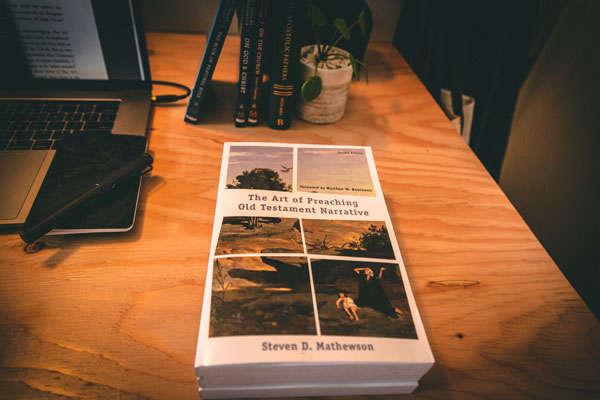Baker Publishes Second Edition of Steve Mathewson's Book on Preaching Old Testament Narrative

Steve Mathewson, DMin, recently released the second edition of The Art of Preaching Old Testament Narrative (Baker), a book which explores a ten-step process to preaching Old Testament narratives from text selection to delivery. The first edition received a Christianity Today award of merit and a Preaching magazine Book of the Year award.
Mathewson is the Director of the Doctor of Ministry Program at Western Seminary. He recently sat down to discuss what's new in the second edition and why learning how to preach Old Testament narratives is just as important today as it was two decades ago when he first wrote the book.
Why did you originally write the book?
I wrote it to help other pastors overcome the same struggles I had in preaching Old Testament (OT) narrative texts. Early in my pastoral ministry, I preached through 1 Samuel, and I realized that I needed more help. The book grew out of my quest to develop my skills in interpreting and proclaiming OT narratives.
What’s been added in the second addition?
I added a chapter on "The Christ-Centered Preaching Debate." That's an issue I didn't deal with sufficiently in the first edition. Then, without changing my basic approach, I updated examples, illustrations, and commentary recommendations for narrative exegesis. There's nothing I dislike more than spending money on a second edition that hasn't changed much since the first one. So I made sure to give the book a complete refresh. I reworked the section on "Using Hebrew in Narrative Exegesis," and I'm excited about that.
How has preaching changed in the last couple decades?
Great question! I sense that expository preaching is making a comeback in a lot of circles. I have to say, though, that I'm more surprised with what hasn't changed. People still love bullet-point lists and fill-in-the-blank outlines. Those have some value, but to preach almost every passage of Scripture as a list is to miss the literary strategy of the writer. That's true throughout Scripture, but especially in narrative texts.
What's the biggest challenge in preaching from the Old Testament?
Wow, it's hard to narrow it down to one! I suppose that less familiarity with the Old Testament itself, as well as with its historical-cultural setting, is still a huge obstacle for a lot of pastors. We tend to be more familiar with Ephesians than with Judges. Also, there are voices out there asking followers of Jesus to consider "unhitching" their teaching of what it means to follow Jesus from "all things old covenant." I deal with these challenges in my book.
Why is understanding narrative crucial to preaching the Old Testament?
It's critical because the amount of narrative literature in the Old Testament is huge! Genesis is predominantly narrative, and there are big chunks of narrative in Exodus. The Former Prophets (Joshua, Judges, Samuel, Kings) are mostly narrative, along with Chronicles, Ezra-Nehemiah, Ruth, and Esther. There are narrative sections in prophetic books like Daniel and Jonah as well. If you don't understand narrative, you won't understand at least one-third of the Old Testament.
What’s one of your favorite Old Testament narratives to preach on?
I'm a fan of Judges 17-18. It rarely gets preached, but it's a powerful narrative about the payoff for idolatry. I use this as the sample sermon manuscript at the end of my book.
How does theological education help pastors become better preachers?
It provides training in the languages in which Scripture was written (Hebrew and Greek), and it helps pastors locate individual texts and books of the Bible in the larger storyline of Scripture. It also provides a grid that shapes/gets shaped by our reading of Scripture. Finally, it introduces pastors to the stunning array of resources available to pastors--lexicons, theological dictionaries, commentaries, etc. It takes discernment to use these.
What makes you excited about Western's Doctor of Ministry program?
I love it because we have not minimized classic pastoral disciplines. Currently, we offer cohorts on preaching, theology in ministry, and biblical languages in ministry. Many DMin programs focus solely on leadership and don't provide opportunities to grow in preaching, theology, or the biblical languages. I'm excited, too, because we have attracted such high quality students. The cohort experience is rich. I learn as much from the DMin courses I teach as our students do!
When you aren’t preaching or teaching, what do you like to do in your free time?
I love to fly fish for trout and to podcast about it. A friend and I are about to restart our podcast 2 Guys and a River. We had 10,000 subscribers when we took a break a couple years ago. I also like to attend my grandkids sporting events: soccer, baseball, and football.